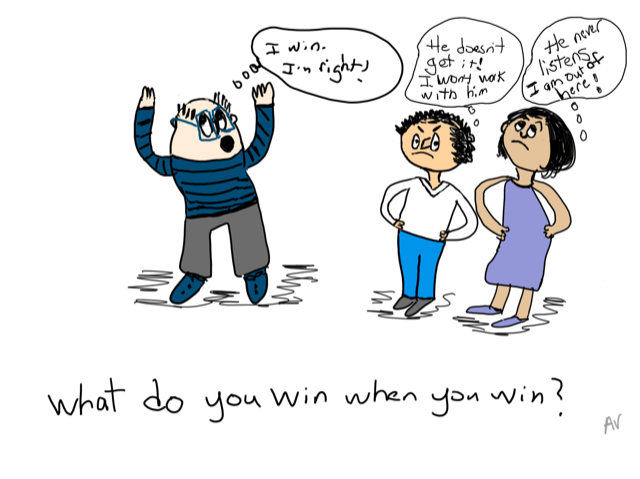“If you lose your temper, you lose!”—Richard Diaz
A senior executive, Leo, stopped by a colleague’s office to thank him for putting in long hours to resolve a significant organizational challenge. After acknowledging the thanks, Jerry, the colleague, began to complain about the organization and the leaders’ decisions. Jerry blamed the senior management team (of which Leo was a member) for cutting off funding for the project. He felt the design was sound and more funds should have been allocated. Leo worked hard to explain the reason further funds were not forthcoming. It made sense to Leo. There were other more pressing priorities and such business choices had to be made. Jerry continued to blame senior management for creating a problem. Leo began to focus on what Jerry could have done to make the project go more smoothly and worked harder to defend senior management’s choice. Jerry would not agree and continued to blame senior management. Leo lost his cool and said something all of us have thought at one time. “If you don’t like it here, you can always leave.” Who has not had such a thought toward a colleague, partner or friend. Unfortunately, verbalizing the sentiment did not support Jerry in being positive toward Leo.
What happened here? Both Leo and Jerry were each trying to influence the other and each were using logic from their point of view while they were experiencing strong emotions. Each believed that he was “right” and the other was “wrong”. Each argued their case and worked hard to “win.”
Each felt he “won” the argument and each thereafter shared their perspective with others who agreed. However, what did they win when they “won”? Now there is negative energy between the two men and the negativity extends to others around them. Each felt drained and their anger persisted. They felt at a standstill and each probably hoped the other would disappear. More likely, they will spread the negative energy further to others in the organization. Future meetings will be uncomfortable. I have seen such negative interactions influence decisions between people for decades in some organizations. The negativity may go underground but influence future interactions and decisions.
Ironically, Leo had good intentions to connect with and show appreciation to Jerry. What could he have done differently? He could have noticed when he was becoming defensive and used a strategy such as consciously breathing and taking a moment to shift to a more open and curious state. He could catch his tendency to want to “win” and ask himself, “What do I win when I win?” He could recall his intention to create positive and productive relationships. When he could manage to be open and curious, Leo could have given empathy to Jerry. “It is upsetting to lose funding for a project that you feel could have been successful with more time and resources.” “It is hard to understand and support some of the decisions made by senior management.” “It is frustrating when you believe senior management does not see the whole situation and the ramifications of some decisions.” Leo could give authentic understanding without meaning he is in agreement. He could even say, “I hear your frustration about the decision. What else should I be aware of?”
While our instinct is to use our intellect and other resources to win at all costs, we can tame that disposition when we reflect on “what do we win when we win?” It is useful to recall our desire to influence through noticing and managing to be open and curious. Our openness and empathy will be contagious and support others in being open in return. It is helpful to also “assume positive intent.”
Like Leo, we all have become defensive and aggressive in our efforts to “win”. Forgive yourself and you may want to apologize and envision you both on the same side, winning together.
Contact us at any time at Potentials.com.

